Note: The criticisms of NBC in 2012 are not applicable to where the network is today. In November of 2019 Jim Bell, who served as President of NBC Olympics Production and Programming left his post. Both USA Gymnasts and NBC will be under new regimes at the 2021 Olympics.
In a previous article I discussed the way the media covers gymnastics and how certain media tactics are sometimes to the detriment to the athletes that are being covered. One example I want to expand on is the American-centric approach NBC takes with the Olympics.
It is not my intention to take a position on whether NBC is justified or in the wrong by focusing on American athletes. Only to point out that in an atmosphere where the Americans are the sole focus of television broadcasters, win or lose the American result is what gets covered. This is not the case in the traditional American sports such as football, baseball, and basketball.
In football the Super Bowl is not just the most watched event on the sports calendar, but is typically the most watched American television event of the year. As the Super Bowl enters its final moments television producers are searching for two critical shots. The first shot involves capturing the coach of the winning team being given a “shower” where he is doused with what remains of Gatorade/water supply. It is such a staple of the Super Bowl broadcast that people bet on which color Gatorade will be used. The second shot is the reaction of the winning team as the clock expires and the game is officially won.
The focus is on the winners celebrating their victory and only a small portion of the remaining broadcast is spent on covering the reaction of the losing team. From the moment the San Francisco 49ers lost the Super Bowl in 2020 their time in the spotlight ended. They didn’t have to partake in any medal ceremony and a player could even disappear into the locker room before the camera managed to catch a glimpse of him.
Television commercials advertising Kansas City “Super Bowl Champions” memorabilia would be the only remaining references in mass media regarding the teams involved. That is the experiences for athletes who compete in Super Bowls and other major events like it such as the World Series. The victors are celebrated and the losers are given the distance they deserve.
That wasn’t McKayla Maroney’s Olympic experience. After covering Sandra Izbasa’s initial reaction to an excellent vault that would decide who would win the gold medal, NBC pivoted to Maroney packing her bag. From this point on the demeanor of the broadcast changed. The focus was no longer about covering the gymnasts reacting to their vaults, but reacting to the final score.

From the moment Maroney started packing her bag there would be 4 minutes and 52 seconds (292 seconds) left in the version that is on NBC’s YouTube page. In that time they spent 21 seconds focusing solely on Maroney, a lengthy duration for a broadcast where television producers have the tendency to rapidly switch shots to avoid audience fatigue.
Note: The YouTube version is all that I could find and it is possible NBC made further alterations to the initial broadcast.
When the final score appeared denoting who would win, NBC had not shown the face of the gymnast actually being scored, but McKayla Maroney as she realized she had lost. In NBC’s defense they quickly pivoted away in an attempt to capture Sandra’s reaction. Another defense of NBC is that they weren’t the only network that had broadcasted Maroney’s reaction to the scoreboard. But that is where NBC’s actions shifted from behavior that was defensible, to coverage that became unnecessary and out of line.

NBC took a standard reaction shot of Sandra that lasted six seconds. But for the rest of the broadcast McKayla Maroney would be featured in nearly every second of the remaining footage. I broke down the final 292 seconds in the graphic below.

The 21 seconds NBC spent on Maroney at the beginning of this segment was longer than the 13 seconds Sandra was given for the duration of the broadcast. The gymnast who won the gold medal received just 4.5% of exclusive coverage. Meanwhile Maroney received 195 seconds of exclusive coverage which came out to exactly two-thirds (66.7%) of the remaining time. There was an additional 79 seconds of shots featuring both gymnasts.

One such shot came as Sandra was receiving a congratulatory hug while Maroney was standing nearby. Immediately after this exchange Sandra walked towards Maroney and gave her a hug. It was shots like these where the focus was also on Maroney that represented the bulk of Sandra’s screen time. In the end Sandra was featured in 31.6% of the screen time from the moment Maroney started packing her bag. Whereas the same footage featured Maroney 93.8% of the time.
During the medal ceremony NBC opted not to show the flags being raised. At no point during the playing of the Romanian national anthem did NBC cameras capture Sandra. What NBC did instead was 90 seconds of Maroney closeup shots. For a minute and a half NBC never pivoted away from Maroney or even switched cameras. The only changes NBC made was changing between a closeup of Maroney’s silver medal, or a closeup of her face.

Saying NBC took closeup shots would be an understatement. They had zoomed in to such an extent that Maroney’s eyebrows were almost out of the shot. NBC had zoomed in so close to Maroney’s eyes that if she shed even the smallest tear, the cameras would see it. Perhaps that was the intent.
It is normal in sports for television broadcasters to show images of athletes reacting to high profile losses. But in the four major American sports showing imagines of losing athletes is kept to a bare minimum. Television broadcasters only do it in order to document the experience of both sides. The footage they take of the losing team is only to meet the bare minimum of what is needed. Images of the losing team are included to avoid a situation where a broadcast appears to deny the existence of that team entirely.
In the 2012 vault final NBC seemed to do the exact opposite. NBC took the bare minimum approach in regards to Sandra who actually won the competition. NBC managed to rise only slightly above not covering her at all in the final 292 seconds. Going as far as to make comments on Maroney’s facial expressions at occasional moments during the playing of the Romanian national anthem. It would not have been out of line to show Maroney, but spending 93.8% of their time on her was. Even more so when it was obvious that Maroney was not in a celebratory mood.
Losing out on an Olympic gold medal is one of the most painful moments a gymnast will ever experience as an athlete, and perhaps one of the most heartbreaking moments of her life. NBC decided to put Maroney under the microscope and saw a 16 year old experiencing heartbreak on the world stage as an opportunity for themselves.
Perhaps NBC simply felt keeping the camera on the American was better for ratings. Perhaps there was something else at play. The more cynical perspective would be to question whether NBC was waiting for Maroney to crack. Waiting for her to burst into tears and have a breakdown. Waiting for her to make a mistake where she exhibits poor sportsmanship by being disrespectful towards Sandra, or doesn’t come across as gracious enough to at least be a silver medalist.
It seemed NBC saw a gymnast when she was at her most vulnerable as an opportunity to find that coveted climatic shot that would define the end portion of the broadcast. They seemed to do it multiple times. First in the immediate aftermath of Sandra’s vault and again during the medal ceremony.
But Maroney never cracked. She displayed signs of disappointment towards herself and even appeared to be in a state of disbelief. But her entire demeanor was of someone who was in control of her emotions. She never came close to displaying anything that could be classified as unsportsmanlike behavior. Maroney beautifully managed the situation by getting through it all without coming off as angry, bitter, ungracious, or somber.
Think about hard this was for Maroney. In every direction there were spectators watching her. Looking down at her bag while she packed it was perhaps the closest Maroney came to establishing some form of space for herself. And still she never cracked.
It goes against human behavior to have to be still and do nothing while others are watching. Maroney had to do it with millions watching. It is human instinct to try to find a distraction to process the nerves, anxiety, and awkwardness of being on the world stage with no purpose other than to stand still. For Maroney, that distraction was moving her lips.
The way she conducted herself throughout this whole ordeal would make Maroney famous. It could even be debated whether the “not impressed” picture did more to increase Maroney’s brand value and sponsorship opportunities than a gold medal ever could. Paradoxically, this story is as much a positive one as it is a negative one. It is a story of Maroney overcoming adversity, her mental toughness, and her ability to make the public fall in love with her.
It is one of the many things that make McKayla Maroney awesome. What NBC had ended up doing was to fully document a moment that would go down in Olympic folklore and reveal Maroney had made the lip gesture on more than one occasion. Coincidentally, this happened on the 40th anniversary of Olga Korbut’s breakout performance at the 1972 Munich Olympics. Forty years prior Korbut had established the trend of women’s gymnastics being one of the most widely covered sports at the Olympics. Forty years later a 1972 newspaper headline that was written to describe Olga Korbut would perfectly sum up Maroney.
She won more hearts than gold.

But Korbut and Maroney each have a hefty amount of gold medals. One final thing Olga Korbut-1972 and McKayla Maroney-2012 have in common, at the next World Championships they both won gold on vault.


Great blog. I never thought about the focus on McKayla but it’s obvious now that you’ve pointed it out. Kudos to her for holding it together and not giving them that tear. Pretty stunning to think that she had to endure Nassar being there while she was dealing with the crushing disappointment of not nailing that second vault. McKayla showed the world exactly who she was when she retained her dignity that day and then join in on the world’s genuine appreciation of her ‘not impressed’ face. Props to Maroney for being the bomb.
LikeLike
The focus on Jordyn Weiber when she did not make AA at these Olympics was equally appalling. There needs to be a level of respect and privacy for athletes.
LikeLike
Maroney is indeed the bomb and was screwed not only by NBC-TV (of course, she’s joined by the USA in that, after Jeff Zucker’s vomitous coronation and hype campaign for dRUMPf) but USA Gymnastics (WHAT a SURPRISE!) She was a great floor worker who could have medaled on that event in big competitions, and could have been a true AA gymnast with decent coaching and encouragement for it.
LikeLike